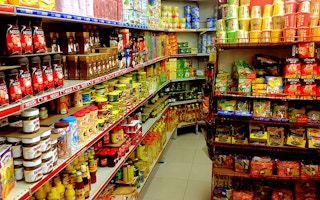New online grocery store Twentyoff has thrown its hat into the saturated e-commerce ring in Singapore, with one mission: to make online grocery shopping more sustainable.
To continue reading, subscribe to Eco‑Business.
There's something for everyone. We offer a range of subscription plans.
- Access our stories and receive our Insights Weekly newsletter with the free EB Member plan.
- Unlock unlimited access to our content and archive with EB Circle.
- Publish your content with EB Premium.
Launched in January this year, Twentyoff encourages consumers to buy groceries in bulk and plan their purchases in advance to minimise CO2 emissions from product deliveries, a key component of emissions from e-commerce.
To do that, the company is offering a 10 per cent discount on orders between S$50-$99, 15 per cent off for purchases of S$100-$149.90, and 20 per cent off for deliveries of over S$150.
Vishal Gupta, one half of the husband-and-wife team that founded Twentyoff, says both the customer and the environment benefit through this arrangement. He explains that Twentyoff, which has made 110 deliveries to-date, does not make a profit on orders with the 20 per cent discount, but he expects to do so as the customer base grows and the company begins to reap economies of scale. Two-thirds of orders so far have exceeded S$150.
Compared to supermarket chains, Gupta says that the company’s e-commerce model produces fewer carbon emissions from transport. This is because goods are typically delivered to a supermarket’s central warehouse and later dispatched to individual outlets, which consumers travel to in order to buy groceries. In contrast, Twentyoff’s products are delivered to its warehouse, and then directly delivered to their customers’ homes, thus theoretically eliminating one leg of the journey.
But Gupta admits that there would only be savings in transport emissions if the consumer originally travelled to supermarket outlets via private transport, as compared to walking.
Another way Twentyoff reduces its transport emissions is by streamlining its delivery schedules to be more efficient, delivering orders between 24 to 48 hours after orders are placed in contrast to the two-hour window offered by competitors Amazon Prime Now and Honestbee, Gupta says. The company provides free delivery services.
Twentyoff also packages items in recyclable Ikea bags instead of disposable plastic bags, and encourages customers to return the delivery bags to Twentyoff.
Gupta says that international e-commerce giants such as Amazon, have a “responsibility” to do more to push sustainability globally. “I don’t think they are doing enough. Ultimately, they are all driven by growth.”A special report by Eco-Business found that few e-commerce companies have a public-facing sustainability strategy in place. To keep ahead of the competition, shopping sites are offering incentives such as free delivery and returns that encourage consumption and, as a result, waste generation.
Though presently constituting less than 1 per cent of Singapore’s estimated grocery market, the online grocery business is expected to grow 10.7 per cent annually, indicating huge market potential. Local e-commerce grocery start-ups, including Honestbee and RedMart, are already gaining traction in Singapore, while incumbent grocers such as Fairprice and Sheng Siong are also increasing their online presence.
“
Twentyoff wants to prove that sustainability can be a good business model, and that sustainability need not cost more.
Vishal Gupta, co-founder, Twentyoff
Meanwhile demand for sustainable ways to shop is also growing; news about the launch of Singapore’s first zero-waste grocery store, Unpackt, went viral and it has revealed plans to launch an e-commerce offering that uses no packaging.
Looking forward, chief operating officer and the other half of the married couple behind Twentyoff, Rajni Gupta, sees three challenges to growth: getting customers used to planning purchases ahead of time, acquiring funding for marketing, and lastly, bringing in fresh produce to cater to the consumption preferences of the larger Singapore population.
Twentyoff also has plans to further green its business operations, including buying its own fleet of Euro VI-compliant or even electric vans, and replacing recyclable Ikea bags with reusable plastic crates for deliveries.
The co-founders aim to reach 20 per cent of Singapore’s population and 10 per cent of Singapore’s retail market, with plans to expand into the rest of Southeast Asia.
Gupta comments: “Twentyoff wants to prove that sustainability can be a good business model, and that sustainability need not cost more.”








